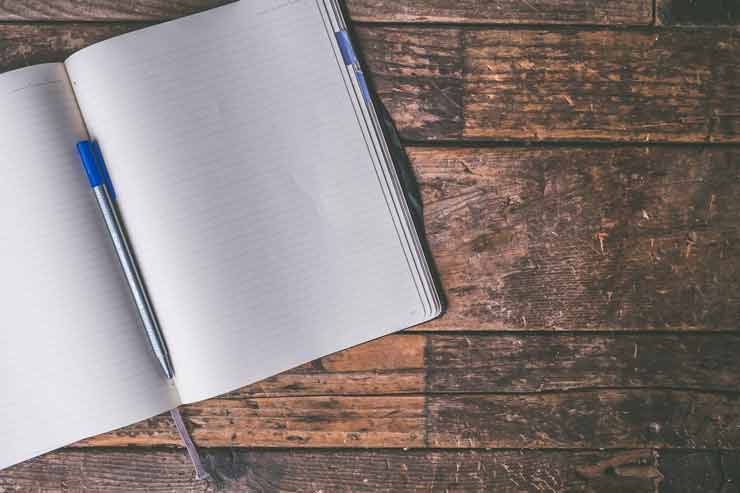When I first started journaling, I had no idea how powerful the practice was. I turned to journaling when I needed a safe space to express myself.
As I continued the practice, my stress, tension and anxiety began to unwind and become lighter day-by-day.
Years later, I’m a different person and it all started with a simple, empty journal.
In this blog post, I’m going to break down how to journal for mental health and why your journal is the most powerful tool you have to start your journey to true inner peace, joy and freedom.
Table of Contents
What is Journaling
Journaling is a practice of self-expression.
In a world where we’re bombarded with content from the moment we wake up to the moment we close our eyes and go to bed at night, journaling is the one private place you have to express yourself.
It is a simple, clean journal.
There are no ads, no distractions and no possibilities that your journal will ever be hacked.
When you sit with your journal, it’s just you, yourself, and your thoughts.
Journaling is a powerful method to invite silence, stillness and peace into your life by taking all the restless energy in your mind, translating it through your body and letting it come out on paper so that it no longer lives in your mind.
Why you should Journal
Journaling is a simple, barrier-free form of self-expression.
When you make journaling a habit, it allows you to dive deeper into your conscious and subconscious mind to uncover the hidden stresses that may be living there.
When done regularly, journalling can become a method to release stress, regulate your emotions and of course, improve your mental health.

When you should Journal for Mental Health
If you’re reading this blog post, you might be reaching the end of your rope and/or looking for a quick fix to improve your mental health.
As the saying goes, you can’t dig a well when the house is already on fire. The well needs to be dug beforehand.
That’s to say that journalling is not a band-aid fix, it’s a long-term strategy. If you want journaling to make a difference in your life, it’s something you have to commit to.
If you’ve never journalled before, it might not provide you with the immediate relief you’re looking for. That said, if you start today and commit to journalling every single day for at least a month, you’ll start to see the deeper effects of journaling.
Once you are grounded in the practice, it will become your anchor in crises.
Journalling vs. Sharing with a Friend, Partner or Mental Health Professional
Both journaling and sharing have their own place in your life.
Sharing with someone can certainly relieve some of the tension you’re experiencing; the limitations of sharing come from subconsciously filtering yourself.
If you’re not already immersed in the world of self-expression and healing, it can be difficult to express your innermost thoughts and allow yourself to be vulnerable in front of others, especially if trust and emotional safety are missing.

Vulnerability and Emotional Safety in your Journal
Traumatic experiences can often trigger shame. At some level, we blame ourselves for what happened and bringing those emotions and experiences out of our minds and into the real world can feel like solidifying that experience and reaffirming our role in it.
In these scenarios, sharing with others becomes nearly impossible—what if they tell us it was our fault?
It’s almost not worth it and this is where we stop ourselves from sharing with others.
Journalling, on the other hand, provides you with both benefits: being able to express yourself in the world and knowing without a doubt that you won’t be judged, blamed or shamed.
The Benefits of Journaling for Mental Health
Before committing to starting to journal for mental health, you might be curious as to what the benefits are.
Your journal is a safe place.
Your journal will be the most patient companion you will ever have and you will never feel judged by it.
As you continue the practice, you’ll be able to write about things you’ve never spoken about out loud and maybe haven’t even admitted to yourself.
The empty pages of your journal will always be there to support you and absorb anything you wish to release.

Your journal will allow you to set healthier boundaries.
As you start to dive into the deeper layers of your consciousness and reconnect with your authentic self, you’ll start to accept yourself for who you are and everything that you’ve been through.
Throughout this process, you’ll build strength, emotional resilience and start to value yourself more and as a byproduct, you’ll set healthier boundaries and instinctively protect yourself from toxic energy.
You’ll be able to let go and move on in life.
When you become grounded in your journaling practice, you’ll learn how to express yourself without filters and journaling will become a powerful way for you to self-regulate and process your emotions.

This is the key to learning how to let go and find peace and happiness.
When you write down your thoughts, emotions and experiences in this form, you are actively removing them from your mental space and freeing yourself from them.
You’ll invite peace of mind.
By continuously releasing stressful thoughts and emotions into your journal, you will stop overthinking and be able to be fully present in your life.
You’ll no longer feel stuck in life, caught up in nostalgia, or anxious about the future.
You’ll be fully present in your life so you can focus on building healthier relationships, making better decisions and finding fulfillment.
How to Start a Journalling Practice for Mental Health
Starting a journaling practice is simple: all you need is a safe space where you won’t be disturbed, a dedicated journal for your thoughts, and a pen.
Set aside 20 – 30 minutes daily to sit with your journal and express yourself.
Ideally, this is at the same time every day so you can build a habit and subconsciously teach yourself to feel safe in your body and let go of stress.
Common times to journal for mental health are early morning before starting your day or in the evening at the end of your day. This will enable you to empty your mind so you can start each day with a blank slate.

The Journey of Journalling for Mental Health
When you first begin to journal, you may find that you’re just recounting your day.
This is normal. Keep going!
When attempting to go deeper, you may find that you’re unwilling or unable to allow some thoughts to come out onto paper.
This is also normal. This is the fear that we talked about earlier showing up. One day, whenever you’re ready, move through the fear and allow yourself to express whatever is on your mind.
Start small and allow yourself to go deeper from there.
This is where the magic happens.
Once you see there are no repercussions of sharing, you’ll start to feel safe in your body and deeper things will start to come out.
Don’t give up.
Pretty soon, you’ll sit down with your journal and your hand will begin moving on its own, writing stories about your life that you aren’t even consciously aware of.
You’ll feel lighter, freer and more balanced.
Life will begin to flow again and you’ll be that much happier.

Why you Need to Journal for Mental Health
Without a safe outlet for your innermost thoughts and emotions, that energy can become stuck and show up as anxiety, physical ailments and poor mental health.
This is likely what drew you to wanting to journal in the first place.
If you give up when the fear shows up, you won’t find the relief you’re looking for. Rather, the negative thoughts and emotions that are coming up will become more intense.
Concluding Thoughts
Life is a combination of ups and downs.
By taking care of your mental health and having a system in place to self-regulate and process emotions, you’ll be able to smile through even the most difficult storms in your life.

Reconnect with your Authentic Self
Combine journaling with the ancient practices of yoga and meditation to take your healing journey to the next level inside Parm’s Spiritual Academy.








Add your first comment to this post